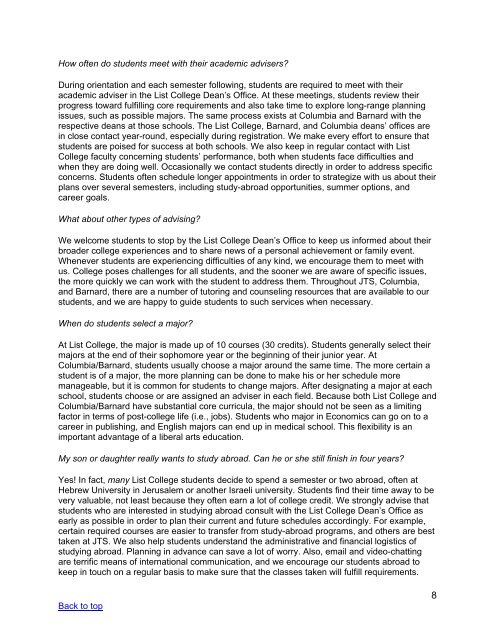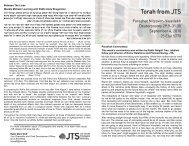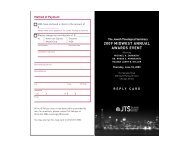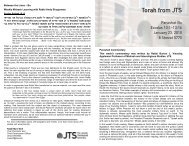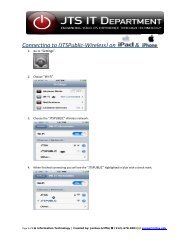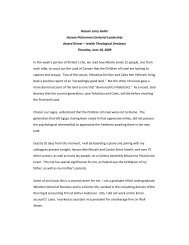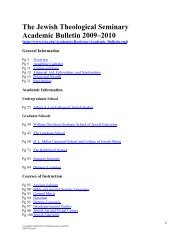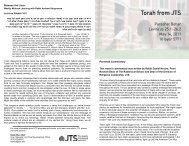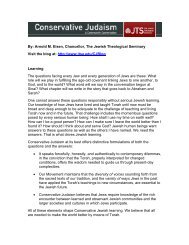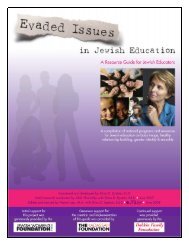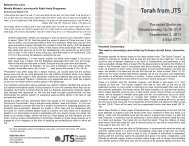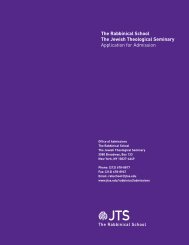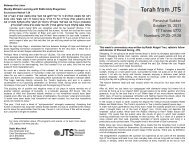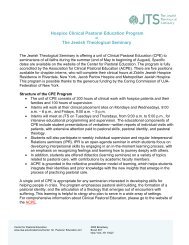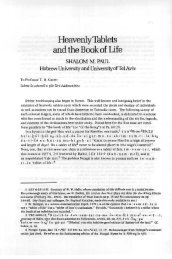Transitions: - The Jewish Theological Seminary
Transitions: - The Jewish Theological Seminary
Transitions: - The Jewish Theological Seminary
Create successful ePaper yourself
Turn your PDF publications into a flip-book with our unique Google optimized e-Paper software.
How often do students meet with their academic advisers?<br />
During orientation and each semester following, students are required to meet with their<br />
academic adviser in the List College Dean’s Office. At these meetings, students review their<br />
progress toward fulfilling core requirements and also take time to explore long-range planning<br />
issues, such as possible majors. <strong>The</strong> same process exists at Columbia and Barnard with the<br />
respective deans at those schools. <strong>The</strong> List College, Barnard, and Columbia deans’ offices are<br />
in close contact year-round, especially during registration. We make every effort to ensure that<br />
students are poised for success at both schools. We also keep in regular contact with List<br />
College faculty concerning students’ performance, both when students face difficulties and<br />
when they are doing well. Occasionally we contact students directly in order to address specific<br />
concerns. Students often schedule longer appointments in order to strategize with us about their<br />
plans over several semesters, including study-abroad opportunities, summer options, and<br />
career goals.<br />
What about other types of advising?<br />
We welcome students to stop by the List College Dean’s Office to keep us informed about their<br />
broader college experiences and to share news of a personal achievement or family event.<br />
Whenever students are experiencing difficulties of any kind, we encourage them to meet with<br />
us. College poses challenges for all students, and the sooner we are aware of specific issues,<br />
the more quickly we can work with the student to address them. Throughout JTS, Columbia,<br />
and Barnard, there are a number of tutoring and counseling resources that are available to our<br />
students, and we are happy to guide students to such services when necessary.<br />
When do students select a major?<br />
At List College, the major is made up of 10 courses (30 credits). Students generally select their<br />
majors at the end of their sophomore year or the beginning of their junior year. At<br />
Columbia/Barnard, students usually choose a major around the same time. <strong>The</strong> more certain a<br />
student is of a major, the more planning can be done to make his or her schedule more<br />
manageable, but it is common for students to change majors. After designating a major at each<br />
school, students choose or are assigned an adviser in each field. Because both List College and<br />
Columbia/Barnard have substantial core curricula, the major should not be seen as a limiting<br />
factor in terms of post-college life (i.e., jobs). Students who major in Economics can go on to a<br />
career in publishing, and English majors can end up in medical school. This flexibility is an<br />
important advantage of a liberal arts education.<br />
My son or daughter really wants to study abroad. Can he or she still finish in four years?<br />
Yes! In fact, many List College students decide to spend a semester or two abroad, often at<br />
Hebrew University in Jerusalem or another Israeli university. Students find their time away to be<br />
very valuable, not least because they often earn a lot of college credit. We strongly advise that<br />
students who are interested in studying abroad consult with the List College Dean’s Office as<br />
early as possible in order to plan their current and future schedules accordingly. For example,<br />
certain required courses are easier to transfer from study-abroad programs, and others are best<br />
taken at JTS. We also help students understand the administrative and financial logistics of<br />
studying abroad. Planning in advance can save a lot of worry. Also, email and video-chatting<br />
are terrific means of international communication, and we encourage our students abroad to<br />
keep in touch on a regular basis to make sure that the classes taken will fulfill requirements.<br />
Back to top<br />
8


